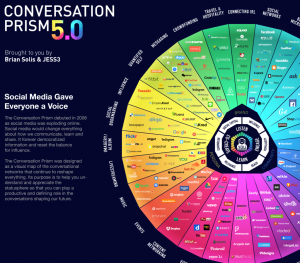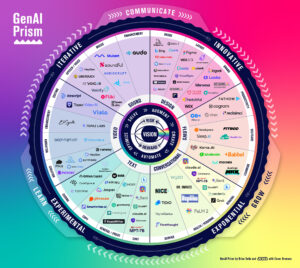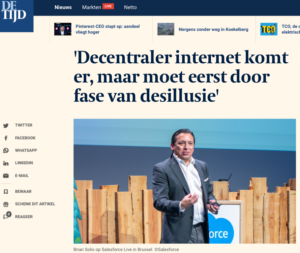
Guest post written by Ian Greenleigh, Social Media Manager at Bazaarvoice. Follow him on Twitter: @Be3D – This is not a commercial post, but solely the views of Mr. Greenleigh
Imagine it is 1881, three years since the printing of the first phone book and the founding of the first telephone exchange company. You’re one of the fortunate few with access to a telephone. Some have been grumbling that the device is a mere novelty, a passing fad. Others predict (correctly, of course) that the telephone is an innovation that will transform the very way humans communicate with one another. You, however, are busy capitalizing on a temporary window of access to decision makers that has been created by the confluence of low adoption and technological immaturity. Simply by dialing a number, you are able to connect directly with those who are all but unreachable by other means, and the relationships established through this exclusive channel will play an invaluable role in your success, and your company’s success in years to come.
But the window soon starts to close. As adoption picks up, the exclusivity that once insulated telephone users from those they did not wish to communicate with quickly becomes a thing of the past. In response, switchboards are invented. Secretaries begin to screen calls for those who cannot be bothered. Unlisted numbers are offered. The gatekeepers arrive, and the era of unobstructed access ends.
We live in another such era, although few seem to notice. Social media affords us access to individuals that have barricaded themselves from nearly all other means of unsolicited contact. Executive assistants and receptionists act as human gatekeepers to company leaders, ensuring that unwanted and unexpected disruptions rarely occur. Technologies like spam filters and Do Not Disturb equip us all with the means to ignore or divert the communications we would rather not receive. And yet, social media channels are relatively devoid of barriers to access.
Broadly speaking, if we intend to communicate with someone that maintains a social media presence, we can do so quite easily. If we mention them on Twitter, for instance, odds are they’ll see it. Even those with more than a million followers will engage with total strangers on occasion; perhaps because they found their content interesting, perhaps for other reasons. Better yet, if their writing appears online (on a company blog, a digital journal, etc.), one would be remiss not to leave a thoughtful comment or two.
Individuals are naturally curious as to what is being said about them, and they are increasingly turning to the Internet for answers.
According to a 2010 Pew study:
More than half (57%) of adult internet users say they have used a search engine to look up their name and see what information was available about them online, up from 47% who did so in 2006. (…) In the latest survey, 70% of internet users with a college degree had conducted a search for their name compared with just 43% of those with a high school degree or less.
Leveraging this phenomenon can be as simple as mentioning someone within a blog post, but some take it a step further. A job seeker named Alec Brownstein recently secured interviews at a top agency by buying ads that appeared whenever creative directors performed “vanity searches” for their own names.
Platforms like LinkedIn and Facebook are gradually implementing measures to limit access, as users demand more comprehensive and navigable privacy options. But newer sites like Quora—largely populated by early adopters— still allow a degree of access otherwise seen only in the early days of the most popular social networks. The individual networks themselves, then, tend to limit access as they become more popular. In the aggregate, our avenues of communication will continue constricting as adoption picks up.
The professional applications of social media are becoming increasingly clear, as job seekers are blogging, salespeople are prospecting through Facebook, and even Fortune 500 CMOs are tweeting. The online communities that used to serve as refuges from the workday are rapidly being integrated into our working lives. As social media starts to feel less like a choice and more like a professional requirement, a perceived need will arise for the same types of barriers workers now take for granted in the office.
But we’re not quite there yet. Because people are still showing up to the social space by choice, it hasn’t yet acquired the “stink” of work as usual. We currently don’t see the need for the same kind of gatekeeping forces that we see in the professional world. It’s unlikely that this will last.
Wherever there is access, there is exploitation—and profit. Spam is estimated to account for 78% of outgoing emails per day, and 10% of Twitter accounts are thought to belong to spammers. Tweet about blogging, for example, and you’re likely to get an automated “bloggers wanted” spam reply, which will exist in your mentions feed until you manually delete it. Exploitation of access like this will ultimately be a major catalyst for the arrival of the social media gatekeepers. But such barriers, whether technological or human, often filter out those with better intentions, as when legitimate emails trigger junk filters and never reach their intended recipients.
Attitudes will harden towards unexpected and unrequested contact, and social media users will develop a heightened aversion to being “pitched,” in much the same way that experiencing phone solicitations can make one hesitant to answer calls from strange numbers.
The cost of this learned caution, and of the coming barriers—perhaps inevitably—will be access.
Image Credit: Shutterstock





This is an interesting perspective I’d not yet considered. “The ‘stink’ of work.” – I like that. Totally makes sense.
To some extent, I’m already there. I’m not much of an early adopter. A few months back, the spammers and bots finally irritated me to the breaking point. I don’t care about my follower count so much as quality, so I set my profile to private and proceeded to block a raft of pointless drivel.
Today, I can talk about social media, Brittney Spears, or even Acai berry/MLM opportunities to my heart’s content and I get no auto-generated DM or follow request. (Not that I have any interest in talking about Brittney Spears or Acai berry/MLM BS!)
My Twitter experience has become far more enjoyable as a result. It’s a step in the right direction. I’m hoping a shift in social consciousness might diminish the need for gatekeepers on some level.
I’m glad you brought that up, Brian. It’s important to realize that there won’t be any grand conspiracy or concerted effort to erect barriers. It will be small, seemingly isolated actions like the ones you describe in your comment. When enough users make little tweaks here and there to limit access, the landscape looks a lot different than it does today.
Agreed. The gatekeepers will simply come about because people will get tired of sorting through drivel in their ever-more-pervasive social media streams. People will naturally develop the same tiers of public/private they do IRL and there will be various forms of gatekeeping between each.
Food for thought. Appreciate your bringing it up, Ian.
Brian, it turned into work for me; I’ve cut back on all online presence. I lurk, but choose to interact very selectively. What I do is keep my streams separate. That way, someone who knows where I am can usually find me fast, but very few know where I’m actively listening (and Facebook is not one of those places!). I suspect most people will eventually get to this point.
I definitely feel ya on the work thing. The separate streams do seem to be a necessity. Strangely enough, I’m finding email makes for a nice back channel for more thoughtful conversations among a select group.
The web has become a great place to re-think reputation (I hate “personal brand”), but the greatest benefits to hyper-connected society come not from volume, but in variety. It’s easier than ever before to connect with each other around the world – here’s to those incredible, real connections.
Cheers.
“…backchannel for thoughtful conversations among a select group.” Reminds one of what Google Wave (or was it Buzz?) was supposed to be, no?
I was really – really – excited at the prospect of Wave. Real-time collaboration across the web? Ysplz. Then it turned out to be this sort of Flash-intensive, slow-loading, PITA.
One good thing about the need for gatekeepers and tiered streams is knowing it will lead to more refined applications potentially handling everything in one place. That’s my social media dream…
Great post! and a worthy question. When will the gatekeepers arrive? I often get very tired of getting spam on my social media accounts. The whole reason I left Myspace back in the day and never returned was because of the number of friend requests I was getting from women looking for a good time. Facebook has done a pretty good job not allowing this to happen, but Twitter is lacking. I am constantly having to block spam followers on my Twitter account that feature nude or almost nude women simply advertising their sexy video. It is a pain! Thanks for the post.
The Green Guerilla
Glad you enjoyed it. Spam is a big problem, and I’m not satisfied with Twitter’s response thus far. For example, we probably have 100+ spam mentions of Bazaarvoice, or spammy links to Bazaarvoice content, on Twitter every day. It’s very hard to proactively block these accounts, and reporting them doesn’t normally do the trick.
The gatekeepers are in the process of being built, in the form of better filters. It’s already easy to block, for example, game status posts on Facebook. Lots of people are clamoring for ways to permanently block location-based app updates, or temporarily ignore someone who’s live-tweeting an event. There are rudimentary tools out there for this already, and I have no doubt they’ll get progressively, rapidly better.
With the right tools in hand, we’ll all be our own gatekeepers : )
“With the right tools in hand, we’ll all be our own gatekeepers”
I think this is ultimately the best we can hope for. Thanks for the comment.
Ian, I agree, it’s the best we can hope for, and it’s pretty cool we have the capability to choose.
Deciding what social media is really reveals a lot about the Decider and his/her view of humanity. Social media is tabula rasa, it is a canvas, a mirror, a vehicle, a template, a plunge into mystery…
Social media and social networks affirm that there is more than one way to be a human.
Nice piece. At the moment, to some extent, there is some etiquette about contacting celebs – on Twitter it makes you look rather silly and needy. But no doubt lots of people still do it. It will be sad to see when gatekeeping gets professional; I remember chat rooms in the mid 90s when they were pleasantly anarchic. Regimentation and hierarchy always seems to come after initial freedom, once people seek to get organised. It’s a recurring human pattern.
Oh, I don’t know if there’s really an etiquette around celeb contact. Maybe among us social media types, but I think it’s fairly common, and people seem to do it without much reservation. Myself included! I still remember the day I got a retweet from Drew Carey. I won’t pretend it wasn’t exciting.
The other norm within communication networks is that once they become congested and therefore less secure, private networks or channels are created. Some of these networks exist simply to exclude certain elements, while others are designed to support a confluence of like thinking. Just as we tend to coalesce around others who share our views (Residence of the global village think vertically) networks form for the same reasons, to help us compartmentalize thought and information. It’s B2C – broad vs. B2B – vertical and one might argue that there are scores of verticals in B2C, but I’m looking at this from the 50K foot level. Social media has yet to sort itself out from this perspective and many of those within it, tend to blur the lines between these two worlds. Just as consumers are not interested in logistics (sorry UPS) and supply chains, much of what takes place in a business is far removed from the consumer. People will always self-identify in ways that attempt to set them apart from others and once the network ceases to support that effort, it breaks down to noise. This is the underlying pattern in communications. Social media is the new vehicle and human nature is the driver.
Ah, great point. We use the term “tribes” in such a celebratory, feel-good manner, we often forget that tribes face inward and are exclusionary by their very nature. Someone brought up MySpace earlier if I recall correctly–what a prime example of the value of a network quickly diminishing as it becomes “congested,” as you term it. Thanks.
Ian: I believe that MySpace died a painful death by providing too little definition and too much flexibility leaving only a niche market possessing the expertise to employ it properly. The majority of tribes (thanks for reminding me) are able to form only when they have common purpose. That means the choice has been made for them (the thinking is done for the most part). Not to hijack the thread (but worth a mention) – Did facebook learn anything from MySpace? On facebook, the users are the product, putting them on the other side of the supply chain (essentially they are the manufacturing floor). Now imagine not being a trained professional working in a company where your tools change every few months. Not sure facebook gets this, and because of its’ growth has it on the radar screen as a potential threat.
Hi Ian,
Nice post. One thing that is important to consider when predicting the level of future gate keeping is the underlying relationship model of the social channel. I think Twitter is ahead of the game with its viral model (I follow you without being introduced and you don’t mind, and I can discover others in your network and follow them), while Facebook and LinkedIn follow a more traditional permission-based model (I need to know you before I will engage with you). There will always be spammers, but unless Twitter completely rewrites the ground rules, I think it will continue to offer us a unique way to start and build relationships.
Sure, but so much of Twitter’s ecosystem is dependent, by design, on third-parties. The gatekeeping will most likely come from them–because the market desires it.
Giving up on the viral model kills Twitter’s sole differentiation. Anybody can do 140-character messages, but the viral follower model can’t be duplicated unless you start out that way. Facebook is falling all over its privacy settings because it’s stuck in the permission-based model. Who are these evil third-parties you’re referring to?
I would say that there’s a built-in gatekeeping function. Similar to the function of an answering machine. For example, somebody tweets me, I can see it and choose to respond or perhaps not to. If I really never want to hear from the person, I could block them.
Yes, but admins and unlisted numbers often provide blocking before a call can even get to VM. Respond or not, you still see tweets.
The generation born between 1980 and 1992 has a very unique advantage as they are the first generation to purchase and use computer products from birth
At this moment, the best gatekeepers are us. When we go through a social media campaign it involves a lot of sacrifices and as owners and managers the best choice and the best action in still in our hands.
Hi,
Really a great post. Social media is the effective way of connecting with potential customers and we surely need gatekeepers since we get a lot of spam in our social media site. Would really welcome this.